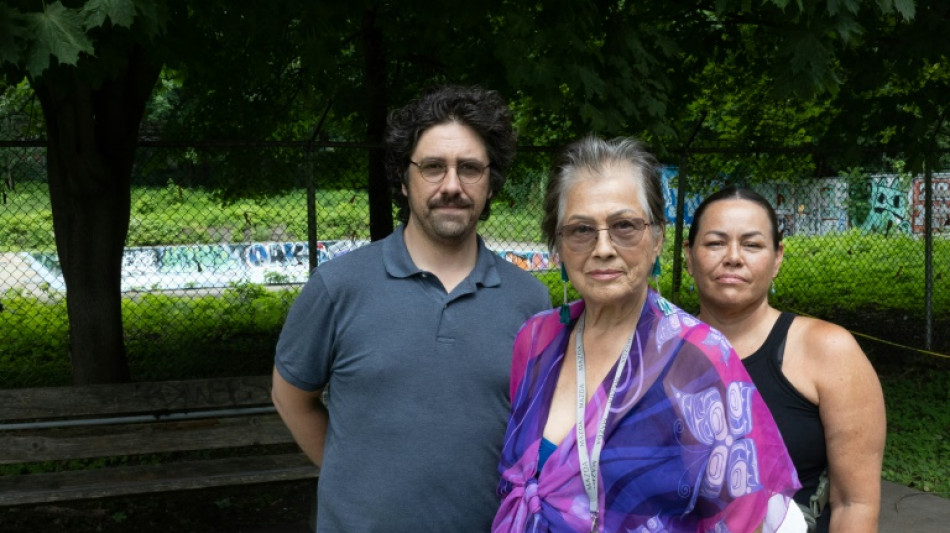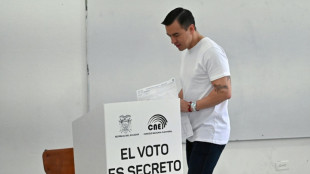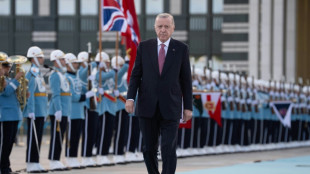
-
 Gauff-led holders USA to face Spain, Argentina at United Cup
Gauff-led holders USA to face Spain, Argentina at United Cup
-
Ecuador voters reject return of US military bases

-
 Bodyline and Bradman to Botham and Stokes: five great Ashes series
Bodyline and Bradman to Botham and Stokes: five great Ashes series
-
Iran girls kick down social barriers with karate

-
 Asian markets struggle as fears build over tech rally, US rates
Asian markets struggle as fears build over tech rally, US rates
-
Australia's 'Dad's Army' ready to show experience counts in Ashes

-
 UN Security Council set to vote on international force for Gaza
UN Security Council set to vote on international force for Gaza
-
Japan-China spat sinks tourism stocks

-
 Ecuador voters set to reject return of US military bases
Ecuador voters set to reject return of US military bases
-
Trump signals possible US talks with Venezuela's Maduro

-
 Australian Paralympics gold medallist Greco dies aged 28
Australian Paralympics gold medallist Greco dies aged 28
-
Leftist, far-right candidates go through to Chilean presidential run-off

-
 Zelensky in Paris to seek air defence help for Ukraine
Zelensky in Paris to seek air defence help for Ukraine
-
Bangladesh verdict due in ex-PM's crimes against humanity trial

-
 A pragmatic communist and a far-right leader: Chile's presidential finalists
A pragmatic communist and a far-right leader: Chile's presidential finalists
-
England ready for World Cup after perfect campaign

-
 Cervical cancer vaccine push has saved 1.4 million lives: Gavi
Cervical cancer vaccine push has saved 1.4 million lives: Gavi
-
World champion Liu wins Skate America women's crown

-
 Leftist leads Chile presidential poll, faces run-off against far right
Leftist leads Chile presidential poll, faces run-off against far right
-
Haaland's Norway thump sorry Italy to reach first World Cup since 1998

-
 Portugal, Norway book spots at 2026 World Cup
Portugal, Norway book spots at 2026 World Cup
-
Sinner hails 'amazing' ATP Finals triumph over Alcaraz

-
 UK govt defends plan to limit refugee status
UK govt defends plan to limit refugee status
-
Haaland's Norway thump Italy to qualify for first World Cup since 1998

-
 Sweden's Grant captures LPGA Annika title
Sweden's Grant captures LPGA Annika title
-
Tuchel lays down law to Bellingham after England star's frustration

-
 Sinner caps eventful year with ATP Finals triumph over great rival Alcaraz
Sinner caps eventful year with ATP Finals triumph over great rival Alcaraz
-
Portugal book spot at 2026 World Cup as England stay perfect

-
 Hakimi, Osimhen, Salah shortlisted for top African award
Hakimi, Osimhen, Salah shortlisted for top African award
-
Sinner beats great rival Alcaraz to retain ATP Finals title

-
 Schenk wins windy Bermuda Championship for first PGA title
Schenk wins windy Bermuda Championship for first PGA title
-
Crime, immigration dominate as Chile votes for president

-
 Kane double gives England record-setting finish on road to World Cup
Kane double gives England record-setting finish on road to World Cup
-
World champions South Africa add Mbonambi, Mchunu to squad

-
 Greenpeace says French uranium being sent to Russia
Greenpeace says French uranium being sent to Russia
-
'Now You See Me' sequel steals N. American box office win

-
 Argentina beat Scotland after frenzied fightback
Argentina beat Scotland after frenzied fightback
-
Argentina beat Scotland after stunning fightback

-
 Pope urges leaders not to leave poor behind
Pope urges leaders not to leave poor behind
-
Pressure will boost Germany in 'knockout' Slovakia clash, says Nagelsmann

-
 Ecuador votes on hosting foreign bases as Noboa eyes more powers
Ecuador votes on hosting foreign bases as Noboa eyes more powers
-
Portugal qualify for 2026 World Cup by thrashing Armenia

-
 Greece to supply winter gas to war battered Ukraine
Greece to supply winter gas to war battered Ukraine
-
India and Pakistan blind women show spirit of cricket with handshakes

-
 Ukraine signs deal with Greece for winter deliveries of US gas
Ukraine signs deal with Greece for winter deliveries of US gas
-
George glad England backed-up haka response with New Zealand win

-
 McIlroy loses playoff but clinches seventh Race to Dubai title
McIlroy loses playoff but clinches seventh Race to Dubai title
-
Ecuador votes on reforms as Noboa eyes anti-crime ramp-up

-
 Chileans vote in elections dominated by crime, immigration
Chileans vote in elections dominated by crime, immigration
-
Turkey seeks to host next COP as co-presidency plans falter


Indigenous mothers fight to search CIA experiment site in Montreal
A group of Indigenous women are hoping to stop the bulldozers at a former Montreal hospital which they believe could hold the truth about children still missing from a grisly half-century-old CIA experiment.
They have spent the last two years trying to delay the construction project by McGill University and the Quebec government.
"They took our children and had all kinds of things done to them. They were experimenting on them," said Kahentinetha, an 85-year-old activist from the Mohawk community of Kahnawake, southwest of Montreal, who goes by just one name.
The activists are relying on archives and testimonies that suggest the site contains unmarked graves of children formerly interned at the Royal Victoria Hospital and Allan Memorial Institute, a neighboring psychiatric hospital.
In the 1950s and 1960s, behind the austere walls of the old psychiatric institute, the US Central Intelligence Agency funded a human experiments program called MK Ultra.
During the Cold War, the program aimed to develop procedures and drugs to effectively brainwash people.
Experiments were conducted in Britain, Canada and the United States, subjecting people -- including Indigenous children in Montreal -- to electroshocks, hallucinogenic drugs, and sensory deprivation.
"They wanted to erase us," said Kahentinetha.
A leading figure in the Indigenous rights movement who has traveled to Britain and the United States to denounce colonialism, she called this fight "the most important of (her) life."
"We want to know why they did this and who's going to take the blame for it," she said.
- Sniffer dogs -
In the fall of 2022, the mothers obtained an injunction to suspend work on a new university campus and research center at the site -- a project worth Can$870 million (US$643 million).
Fellow activist Kwetiio, 52, who also uses just one name, said they insisted on arguing the case themselves without lawyers, "because in our ways, no one speaks for us."
Last summer, sniffer dogs and specialized probes were brought in to search the property's expansive and dilapidated buildings. They managed to identify three areas of interest for excavations.
But, according to McGill and the government's Societe Quebecoise des Infrastructure (SQI), "no human remains have been discovered."
The Mohawk mothers accuse the university and the government infrastructure agency of breaching an agreement by selecting the archaeologists who did the search and then ending their work too soon.
"They gave themselves the power to lead the investigation of crimes that were potentially committed by their own employees in the past," says Philippe Blouin, an anthropologist working with the mothers.
Even though their appeal was dismissed earlier this month, they have vowed to continue their fight.
"People should know history, so that it does not repeat itself," said Kwetiio.
In recent years, Canada has opened its eyes to past atrocities.
Generations of Indigenous children were sent to residential schools where they were stripped of their language, culture and identities in what a 2015 truth and reconciliation report said amounted to "cultural genocide."
Between 1831 and 1996, some 150,000 Indigenous children were taken from their homes and placed in 139 such schools. Several thousand never returned to their communities.
In May 2021, the discovery of unmarked graves of 215 children at the Kamloops Indian Residential School in British Columbia started a national reflection on this dark chapter of Canadian history, while sparking searches for more graves across Canada.
"It was not only residential schools, it involved hospitals, sanatoriums, churches and orphanages too," said Kwetiio.
For her, what is most important is shedding light on what happened in order for "things to change," and to recreate "the harmony that we had before colonialism."
D.Qudsi--SF-PST




